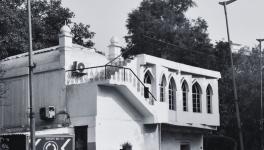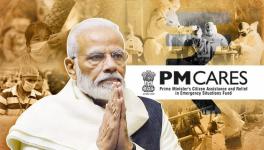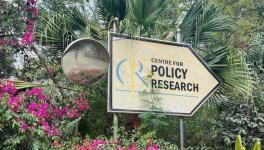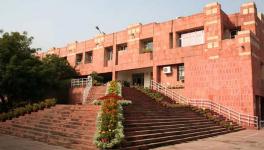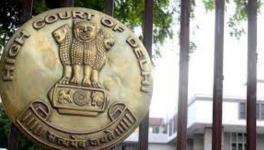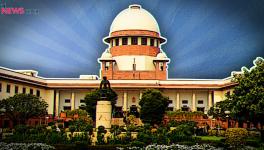Curious Case of Hotel Le Meridien’s Dues
New Delhi: India’s premier investigating agency, the Central Bureau of Investigation (CBI) has, for over five years now, been probing the alleged complicity of certain senior officials of the New Delhi Municipal Council (NDMC) –– that oversees the administration of the small but important part of the National Capital Territory (NCT) in which India’s most influential individuals reside ––with the owners of the fancy, five-star Hotel Le Meridien, to evade statutory dues. The CBI seems to have acted in a rather tardy manner and the council, too, has apparently not made major efforts to expedite the recovery of its dues, as it appears after a review of documents related to the case by NewsClick.
The CBI inquiry was initiated in October 2015 when, following allegations that the company owning the hotel had not paid licence fees, the NDMC was asked to submit records relating to the dues of several opulent hotels in central Delhi, including Hotel Lalit, Hotel Taj Mahal, besides Hotel Le Meridien. While the initial probe by CBI was only against Le Meridien, the scope of investigations was later widened to include other hotels in Lutyens’ Bungalow Zone (LBZ) operating under similar licencing arrangements with NDMC.
The area that comes under the NCT of Delhi is administered by three local bodies, the then Municipal Corporation of Delhi (MCD), the NDMC and the Cantonment Board. The MCD (it was trifurcated into three corporations in 2012) oversees approximately 96% of the area and the population of the Union Territory of Delhi, whereas the NDMC area is barely 3% of the area where a similar proportion of the population of the NCT lives. However, this relatively small area has historically been the seat of central authority in the Union of India. The LBZ includes Rashtrapati Bhawan, Parliament House, the Supreme Court of India, North Block and South Block, buildings used by state governments, besides several offices of the Union government and diplomatic missions.
The government of India is almost the sole landowner of the NDMC area and also owns around 80% of the buildings in the area. There are just a few privately-owned properties in this area, and these are owned by the wealthy. It is, therefore, surprising that the powers-that-be have dragged their feet in getting its dues from the company that owns a plush hotel in the heart of the nation’s capital.
Token Coercive Action
Over a period of five years, the only coercive action that has been taken in the case relating to non-recovery of dues from the company owning Hotel Le Meridien, that is, CJ International Hotels Limited (CJIH), seems to be the suspension of a junior NDMC official in March 2019 for allegedly engineering a fraudulent licence fee settlement with the company.
The NDMC leased out 4.5 acres of prime land for the hotel located at 1 Windsor Place, Janpath. CJIH is required to pay an annual licence fee to NDMC that is just over one-fifth or 21% of its gross turnover or an amount of Rs 2.68 crore, whichever is higher. This fee is payable for use of the land leased to the firm as per an agreement executed in July 1982.
More than three decades later, in March 2015, at a time when the company reportedly owed a total of Rs 526.96 crore to the government, the NDMC decided to “settle” the licence fee dispute for a one-time payment of only Rs 150.92 crore or less than one-third of the amount allegedly owed to it.
Hotel Le Meridien’s licence was terminated by NDMC in March 2017 after it alleged that not only had CJIH’s promoters colluded with certain officials of the municipal body to cook up a highly truncated “outstanding” licence fee amount, but had also constructed structures on sub-leased areas within the hotel premises for commercial activities in an unauthorised manner, thereby earning windfall profits illegally.
Notwithstanding the original agreement that CJIH had with NDMC –– and the profits that had accrued from running its hospitality services together with the leasing out of commercial spaces within the hotel’s premises –– the company pleaded in court that the amount demanded from it by way of licence fees was “atrocious(ly)” high.
The hotel’s promoters had gone to the Delhi High Court after NDMC issued a recovery notice against it in 1999 demanding a payment of Rs 1.09 crore. In the notice, the NDMC had threatened that that if CJIH failed to pay its dues, it would be liable to forfeit ownership of the property. Two years later, however, the high court issued an order restraining NDMC from seizing the hotel, provided its promoters paid the outstanding licence fees together with an interest of 10% per annum. After HC order issued in May 2001, the company began paying a sum of Rs 1 crore every month to NDMC.
A source, speaking on condition of anonymity, told one of the authors of this article that Rs 1 crore that was being paid once a month was merely the arrears of licence fees that had accumulated and needed to be cleared. Besides, these payments were made in an ad-hoc manner, he claimed.
The Delhi High Court order was apparently not adhered to. The order had estimated that CJIH owed NDMC a “principal” amount of Rs 269.99 crore by way of unpaid licence fees. In addition, Rs 256.97 crore was the interest dues. “The total dues of the company, thus, worked out to approximately Rs 526.96 crore at the end of the financial year 2013-14,” the source added.
Curious Legal Tussles
Surprisingly, a letter was issued by NDMC on March 2, 2015, pegging the outstanding licence fees at just Rs 150.92 crore. The company’s promoters paid up the amount in less than a month.
The then NDMC head, Jalaj Srivastava, a 1984-batch officer of the Indian Administrative Service (IAS), is reported to have said: “We received four cheques today (March 26, 2015) from CJ International Hotels Ltd amounting to Rs 150.92 crore towards licence fee arrears in respect of Hotel Le Meridien. We would also be adjusting Rs 29.50 crore paid by them during the financial year 2014-15. Hence, the total amount recovered during the year is Rs 180.42 crore … As per the orders of Justice SK Mahajan, we had recalculated the arrears of licence fee amounting to Rs 150.92 crore. We had sent them a letter earlier this month asking them to clear the dues by March 31 and they have done so without any ‘unpleasantness’.”
In April 2015, the case instituted by NDMC against CJIH was withdrawn from the Delhi High Court on the insistence of the hotel’s promoters. Still, all was far from well.
The Union Home Ministry, which at that time was headed by Rajnath Singh, a senior leader of the Bharatiya Janata Party (who is now Union Defence Minister), ordered a CBI inquiry into the allegations of evasion of licence fee by the company. In its own internal inquiry report dated July 20, 2015, the ministry noted that there was need for wider investigation into the affairs of the hotel.
The report specifically noted that it was important to investigate if there existed any links between officials of NDMC and those in CJIH headed by Harjit Kaur, chairperson of the company’s board of directors. Kaur is the widow of the late businessman-turned-politician Charanjeet Singh, who was elected to the Lok Sabha from the South Delhi constituency on a Congress ticket in the 1980 general elections.
The slow pace of the CBI investigation and the lackadaisical manner in which the NDMC has acted to recover its dues are all the more surprising, given the past association of CJIH’s promoter with the political opponents of the ruling BJP.
The CBI enquiry into the affairs of the firm that owns Le Meridien was ordered after the report of the Home Ministry was sent to it. At the eye of the storm was IAS officer Srivastava who had headed NDMC between July 2013 and April 2015. He superannuated in April 2019, after reaching the mandatory retirement age.
The CBI probe opened a can of worms. Citing the agency’s investigation report, the NDMC appealed the Delhi High Court urging it to reopen the case. CJIH’s lawyers pointed out that the company had already paid the Rs 150.92 crore demanded of it in March 2015. In its application to the court, the company relied upon two file notings dated March 13 and April 29, 2015. These notings had purportedly been made by the then senior assistant of NDMC, Kishore Prasad, after the council met on February 26, 2015. At that meeting, it was claimed that the “net arrears” of CJIH till the end of March 2014 totalled Rs 150.92 crore.
Lawyers representing the hotel company’s promoters argued in court that the figure of Rs 150.92 crore had been approved by those at the highest levels in NDMC. (As alluded to earlier, Prasad’s service in NDMC was terminated following an internal inquiry.) Against the Delhi High Court’s order allowing five deductions to the outstanding licence fee, Prasad and other officials in the NDMC had reportedly allowed 21 deductions and thus, the outstanding amount owed by CJIH was slashed to Rs 150.92 crore.
In August 2016, the earlier court order closing the case, was set aside by the high court and a fresh round of legal tussles began. According to the annual financial statement of CJIH, till the end of fiscal 2013-14, the municipal body had calculated that the amount outstanding as licence fee from CJIH at Rs 518.18 crore. A demand notice for the amount was issued on November 7, 2016.
The lawyers representing the hotel company’s promoters, however, claimed that CJIH owed nothing to NDMC as the outstanding licence fee of Rs 150.92 crore had already been paid.
An inspection was then conducted by senior NDMC officials of the hotel’s premises to ascertain if commercial spaces inside it had been sub-leased in an illegal manner. The findings of this inspection were discussed by the council’s members on March 2, 2017. The recorded minutes of this meeting indicate that, according to the inspection report of NDMC, the hotel’s promoters had not only violated the terms and conditions of the lease agreement but had also made windfall profits by sub-leasing commercial spaces.
The minutes read:
“(b) … [the inspection] revealed that 29 shops in the Hotel and 95 spaces in the commercial tower at the Hotel Property, with an aggregate area of 83,749 square feet, were illegally sub-licenced for a consideration at Rs. 330 per square feet per month, which in total comes to Rs. 2.75 Crores per month. The said consideration earned on account of illegal sub-licensing is being suppressed in the balance sheet of the Company while calculating the Gross Turnover.
“(c) CJIH was not permitted to sub-licence the said 29 shops in the Hotel and 95 spaces in the commercial towers, as per the terms of the Licence Deed, and the Company by doing so, has played a fraud upon NDMC by not only suppressing the income while calculating gross turnover but also violation of the Licence Deed/breach of agreement. The NDMC noted that the sub-licenced spaces are liable for sealing and eviction.”
Subsequently, NDMC issued a notice demanding Rs 124.84 crore from CJIH as penalty for violating building bylaws by constructing unauthorised commercial units within the premises of Le Meridien.
A detailed questionnaire was emailed to the NDMC chairman, IAS officer Dharmendra (he uses only one name) and the council’s director (public relations) R N Singh on the night of Monday, January 11, 2022. We asked them to detail the steps taken to recover the council’s dues from CJIH.
We also wrote to CJIH chairperson Harjit Kaur and the company’s director Tarun Thakral asking them to explain how Hotel Le Meridien has continued to operate despite the termination of its licence.
No response had been received from either the officials of NDMC or CJIH till the time of publication. This article will be updated as and when the responses are received.
The Delhi High Court was informed by NDMC in September 2021 that orders directing the eviction of the company from the hotel’s premises had been issued. The CBI had also been informed by NDMC that the closure order of the legal case that had been issued by the court in November 2016 had since been set aside by the same court
It may be recalled that CJIH had been incorporated in November 1981 as a subsidiary of Pure Drinks Private Limited, the makers of the now-discontinued aerated soft drink brand Campa Cola. Hotel Le Meridien had been set up by CJIH at a time when there was “inadequate” luxury accommodation for foreigners who were expected to visit Delhi for the 1982 Asian Games.
When will CBI complete its probe on whether top government officials in the NDMC colluded with the promoters of a private hotel company to allow them to get away with paying meagre licence fees for occupying expensive land in the heart of the national capital for nearly four decades? The dispute is expected to be soon heard by the Delhi High Court.
The authors are independent journalists.
Get the latest reports & analysis with people's perspective on Protests, movements & deep analytical videos, discussions of the current affairs in your Telegram app. Subscribe to NewsClick's Telegram channel & get Real-Time updates on stories, as they get published on our website.










